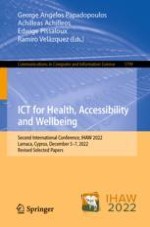2023 | OriginalPaper | Chapter
Improving Student Mental Health Through Health Objectives in a Mobile App
Authors : Mikhail Vinogradov, Maiga Chang, Fuhua Lin, Yang Yan
Published in: ICT for Health, Accessibility and Wellbeing
Publisher: Springer Nature Switzerland
Activate our intelligent search to find suitable subject content or patents.
Select sections of text to find matching patents with Artificial Intelligence. powered by
Select sections of text to find additional relevant content using AI-assisted search. powered by
